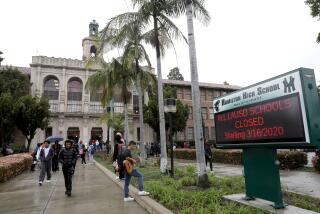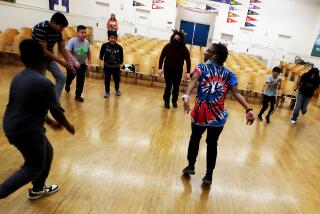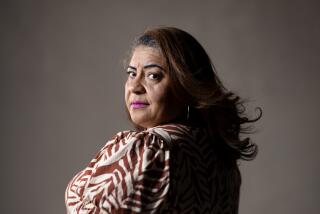L.A. school board member Monica Ratliff is on a new learning curve
This is not exactly a be-careful-what-you-wish-for story, but it sort of is.
Monica Ratliff was a reasonably happy teacher at San Pedro Elementary School on the edge of downtown Los Angeles.
“I just love the classroom,” said Ratliff, for whom teaching was a second career.
The Ivy League-trained lawyer had been working at San Fernando Valley Legal Services in Pacoima but decided a better way to help people escape poverty would be to teach. So she went back to school (UCLA) for a teaching degree and started her new career in 2001.
“I love schools, I love the environment, I love what you’re doing in there, and I love the kids,” Ratliff said.
But she didn’t love the way the district was managed, or the way edicts were imposed on teachers without full consideration of the effects, and she suspected there was a lot of waste in the L.A. Unified’s roughly $7-billion budget.
So she ran for an open seat on the school board in 2012, knowing that if she won, she’d take a huge pay cut.
It was a bold move, considering that she had no money to run, no political know-how and was the underdog to a candidate being bankrolled by the powerful and well-heeled Coalition for School Reform. Ratliff didn’t even have the full support of her own union — UTLA endorsed both Ratliff and her foe, but didn’t do much of anything for either.
It should have been a slaughter. Ratliff lost the fundraising competition in a landslide, roughly $2 million to $50,000.
But to everyone’s surprise, including her own, well, you know what happened.
Her staggering upset may have been both a credit to her straightforward authenticity as a concerned teacher and a backlash against the powerful Angelenos who were determined to remake the board. When she joined the board 18 months ago, Ratliff was grateful to be beholden to no one and eager to make an impact.
But that part has been more complicated than she expected it to be.
“I evaluate myself a lot,” Ratliff said. “I do a good job of asking questions and reading materials. I have ideas. But what I’m not so good at is building consensus behind the ideas. I literally thought that if you throw out good ideas — not that all of my ideas are great — people will work with them, build on them, make suggestions and together we’ll arrive at something.”
In public education, though, there’s no consensus about what constitutes a good idea, and lots of competing interests. Ratliff said she wants more of an investment in campus safety, she thinks there should be a second adult in elementary classrooms to prevent future molestation scandals, and she wants to do something radical about class size, but she hasn’t gotten traction on any of that.
I asked if being an independent rookie, as opposed to being a part of an identifiable voting bloc, might make it harder to get anything accomplished.
“That’s what I’m concerned about,” she said.
No doubt, the job involves some politics, and that’s a down-and-dirty game that requires a warm touch and a cold heart. Nobody goes pro overnight.
But even so, Ratliff has already made an impact. Her greatest strengths so far are that she’s not a patsy for either the administration or the teachers union she served as a chapter chair, and she’s not afraid to challenge either side or ask tough questions.
Ratlifff led a committee that spent 10 months probing the district’s $1.3-billion iPad plan. The committee found evidence of lousy planning, a lack of transparency and a flawed bidding process. Ratliff sharply questioned the one-size-fits-all aspect of the tablet plan and wondered why less-expensive options weren’t explored.
Just last week, the FBI hauled away 20 boxes of documents as part of a grand jury criminal investigation.
“She ran the iPad hearings like the Henry Waxman hearings on tobacco, and she didn’t even have a staff yet,” said former school board member David Tokofsky. Ratliff had an “outstanding freshman year,” he went on, but he said she needs to graduate to policy matters in the years to come, drawing on her teaching experience to guide discussions on daily instruction.
Ratliff called me Monday to quibble over a point in my Sunday column, in which I said the district had a disastrous year, with one major debacle after another. I also said there were lingering divisions as to whether the board or the superintendent was in charge.
On the last point, Ratliff told me she likes Supt. Ray Cortines, who stepped in for the departed John Deasy, and she said they’re working together just fine. The culture has changed, she said. Cortines invites questions and collaboration, whereas Deasy’s critics often complained about an off-putting autocratic style.
Alright, I said. Good enough. And while I had her on the phone, I wanted to ask Ratliff if she ever regrets having left teaching to step into the morass of administration.
She had an interesting answer. She said she dreams a lot every night, variations on a theme.
“I dream a lot about teaching,” she said.
In the dreams, she said, she’s either back in the classroom at her old job, or someone’s blocking her from going back.
In real life, she even proposed having school board meetings in the evenings, since that would allow her to teach by day, but that’s another idea that didn’t fly.
After our phone call, I met with Ratliff for over an hour in her 24th-floor office at district headquarters to talk further about what she’s found since joining the board.
Ratliff said she was shocked by the number of empty desks at headquarters, where staff has been trimmed, and she no longer believes, as she once did, that the district has more than enough money to carry out its mission if it would just spend more wisely. In fact, she handed me a report that projects a $784.5-million deficit by the 2016-17 school year.
She also used to think it might be best to break the district into several smaller ones, but she now believes that would only create multiples of the same challenges.
Ratliff said she’s glad she ran, and if she sees a chance to implement substantive changes for the betterment of all students, she’ll run for reelection. But she’s not leaning that way at the moment.
“I miss having the chance to say, ‘OK, we’re starting chapter one of ‘Old Yeller’ today,’” she said. “I want to know I’m making a difference in children’s lives.”
More to Read
Sign up for Essential California
The most important California stories and recommendations in your inbox every morning.
You may occasionally receive promotional content from the Los Angeles Times.











